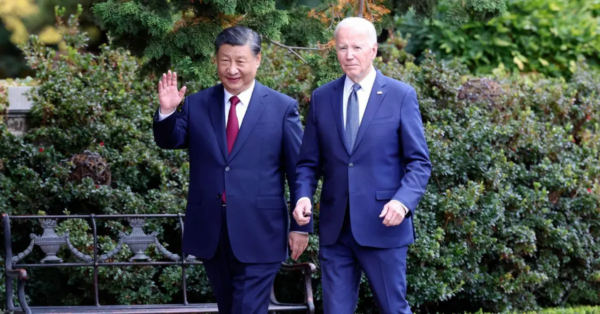Photo: Chinese President Xi Jinping (L) warned President Biden (R) last month that he intends to reunify Taiwan with mainland China but that the timing has not yet been decided,” Xi said.
REUTERS
Chinese President Xi Jinping warned President Biden last month that he intends to end Taiwan’s decades-long de facto independence — peacefully, if possible.
Xi told Biden that “Beijing will reunify Taiwan with mainland China but that the timing has not yet been decided,” NBC News reported Wednesday, citing three current and former US officials briefed on the meeting.
The White House didn’t deny the exchange, which occurred during a Nov. 15 summit outside San Francisco that was attended by a dozen US and Chinese officials.
“I’m not gonna get into the specifics of the discussion between the two leaders,” National Security Council spokesman John Kirby told reporters on Air Force One en route to Milwaukee. “I think you can understand I’m not gonna read out that private conversation.”
“President Xi has been public and clear about his desires for reunification — that’s not something that’s different or new,” Kirby added.
The White House spokesperson went on to say that the US will continue to adhere to its “One China” policy of not recognizing Taiwan as independent and added that “as the president has said, there’s no reason for this to come to blows.”
At the summit, Xi said that “China’s preference is to take Taiwan peacefully, not by force,” and said that “US military leaders who say that Xi plans to take Taiwan in 2025 or 2027 … were wrong because he has not set a time frame,” NBC reported.
The so-called Chinese “president for life” and Biden met for four hours and US readouts of the talks didn’t mention any notable updates regarding Taiwan, which has been self-governing since the 1949 victory of Mao Zedong’s Communists in the Chinese civil war.
Biden said last year that US troops would defend Taiwan if it was threatened by Beijing.

Under threat, Taiwan seeks allies – Stellina (Taïwan)
Taiwan, which has a population of more than 23 million, began a process of democratization in the late 1980s after decades of rapid economic growth. Its current president, Tsai Ing-wen, has infuriated Beijing by asserting that the mostly Chinese-populated island already is independent.
Taiwan has been ruled by Beijing for only some of its history. It previously was ruled by Japan for 50 years — from 1895 to 1945 — after about two centuries of control by China.
Xi’s government has pursued an expansionist foreign policy — including asserting ownership of disputed islands in the South China Sea and ending Hong Kong’s political autonomy in 2020 despite assurances in 1997 that the former British colony would have 50 years of self-rule.
The Chinese Embassy in Washington did not immediately respond to a request for comment.
US-China relations are a significant issue in next year’s presidential election, with Republicans arguing Biden isn’t tough enough on issues such as fentanyl exports, which have fueled record-high US drug overdose deaths.
Tensions in 2024 ?
China and the U.S. are ending the year with an uneasy detente.
This follows their November meeting where both men signaled a desire to stop the free fall in their countries’ relations.
2024 could bring new turbulence. From presidential elections in Taiwan and the U.S. to continued U.S.-China trade fights, Biden and Xi face no shortage of problems that could cause a stumble in the new year.
First up will be Taiwan’s Jan. 13 presidential and legislative elections. How China reacts could determine whether the relationship between the world’s largest economies becomes recharged with mutual suspicion.
Vice President Lai Ching-te and running mate Hsiao Bi-khim from the ruling Democratic Progressive Party are leading in the polls. China has labeled them as the “independence double-act” and rebuffed Lai’s offers of talks.
Elections on the island, which China considers its own territory, have previously escalated tensions, most notably in 1996.
This time Beijing has again ramped up military and political pressure, framing the elections as a choice between “peace and war,”
NY POst/ Reuters


Leave a Reply
You must be logged in to post a comment.